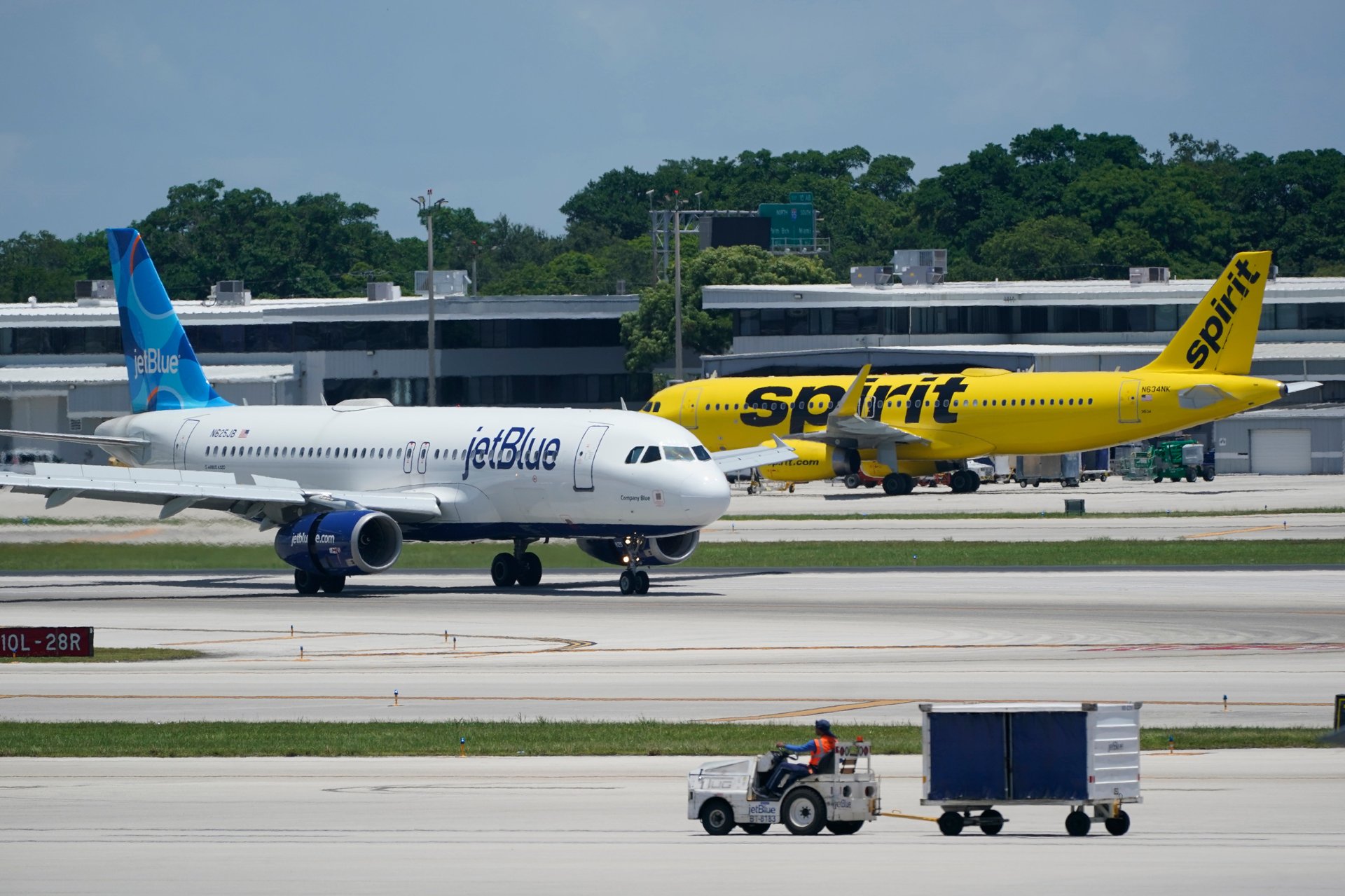Biden administration takes on JetBlue as its fight against industry consolidation goes to court
The Biden administration and JetBlue Airways are facing off in court over the Biden administration's effort to stop JetBlue from buying Spirit Airlines

The Biden administration’s fight against consolidation in the airline industry is being tested Tuesday as lawyers for JetBlue Airways and the Justice Department squared off in court.
Suggested Reading
The administration is suing to block JetBlue’s proposed $3.8 billion acquisition of Spirit Airlines. The trial in federal district court in Boston could reshape the market for low-cost airlines — Spirit is by far the nation’s biggest budget carrier, and it will disappear if JetBlue wins the case.
Related Content
As the trial began with opening statements from lawyers for sides, shares of JetBlue were falling to their lowest levels in more than a decade after the airline reported a wider loss than expected in the third quarter and predicted another surprisingly large loss for the fourth quarter.
Executives declined to take questions about the Spirit deal. CEO Robin Hayes said it would be inappropriate while the matter was being debated in court.
The Justice Department is fresh off victory in a previous lawsuit that killed a partnership between JetBlue and American Airlines.
JetBlue isn't exactly the sort of behemoth that comes to mind when imagining a defendant in an antitrust case. It is the sixth-largest U.S. airline by revenue, and it is trying to buy the seventh-biggest. If it swallows Spirit, JetBlue will leapfrog Alaska Airlines but still control less than 10% of the U.S. air-travel market. It would remain far smaller than American, United, Delta or Southwest.
But if JetBlue gets its way, it will grow its fleet about 70%, repaint Spirit's yellow planes and make them less cramped inside.
The New York carrier argues that it needs Spirit to bulk up and compete better against the bigger airlines. JetBlue touts itself as “one of the most disruptive and innovative companies in the history of the airline industry,” and says it can bring down fares if it can go head-to-head against the Big Four on more routes.
The Justice Department argues, however, that Spirit is the disruptive force that needs to be protected.
“Consumers are better off with an independent Spirit, not a JetBlue intent on removing seats from planes and charging higher fares,” government lawyers argued in their pre-trial brief. They say the harm will fall hardest on cost-conscious consumers.
JetBlue says the vacuum left by Spirit would be filled by growth from other discount airlines. The Justice Department says that is unlikely because all airlines, including the budget carriers, face limits to growth including shortages of planes and pilots.
Spirit, which is based in Miramar, Florida, is known as an “ultra-low-cost carrier,” the name given to airlines that tout rock-bottom fares but make up for it by charging high fees for things like checking a bag or carrying one on board. Spirit even charges for soft drinks. Personal-finance site Nerdwallet said passengers should expect to pay $137 in fees on a typical one-way flight, compared with $35 or less at the bigger airlines – including JetBlue.
This isn’t the first time that the government has challenged an airline merger. In 2013, regulators sued to stop the merger of American Airlines and US Airways. The deal, which created the world’s biggest carrier, went through without a trial, however, after the airlines agreed to give up some gates and takeoff and landing rights at seven major airports.
JetBlue tried that strategy: It offered to divest gates and landing and takeoff rights and gates in Boston, the New York City area and Fort Lauderdale, Florida, to Frontier and Allegiant. The government scoffed at the offer, saying those discount carriers have pledged to fly the same routes that Spirit flies now.
The Biden administration may be having remorse for mergers that the Obama administration allowed to go through and which eliminated Northwest, Continental, US Airways and AirTran as competitors to the four largest U.S. airlines.
The new trial is taking place in the same Boston courthouse where the Justice Department prevailed against JetBlue and American, but the case is being heard by a different judge. It is expected to last until early December.
In New York on Tuesday, executives of JetBlue Airways Corp. blamed bad weather in September, air traffic control problems and rising fuel prices for the company's $153 million loss in the third quarter — a wider loss than expected.
JetBlue forecast an adjusted loss of 35 cents to 55 cents per share and lower revenue over the last three months of the year. Analysts expected a loss of 15 cents per share, according to a FactSet survey.
The airline's shares fell 10.5% to close Tuesday at $3.76, their lowest level since November 2011.
